- WE MOVED !!!
-
 Professional Acupuncture & Physical Therapy1118 East Superior Street
Professional Acupuncture & Physical Therapy1118 East Superior Street
Duluth, MN 55802(218) 724-3400 Clinic Hours
Mon8:00 am - 4:30 pmTue1:45 pm - 4:30 pmWed8:00 am - 4:30 pmThu8:00 am - 4:30 pmFriCLOSED

- Long Covid Booklet
Acupuncture
What is Earthing?
Getting outside does the body good. There are scores of scientific studies that confirm just how good! But “earthing” takes a walk outside to another, deeper, more healing level.
What Is Earthing?
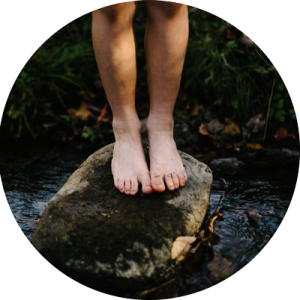 Also called “grounding,” earthing simply means walking barefoot on a natural surface like grass, soil, or sand. It’s important to remember that it is different than just walking outside, although that, too, is beneficial in so many ways. Making direct physical contact with the ground—and that doesn’t mean concrete or other man-made surfaces—is what it’s all about.
Also called “grounding,” earthing simply means walking barefoot on a natural surface like grass, soil, or sand. It’s important to remember that it is different than just walking outside, although that, too, is beneficial in so many ways. Making direct physical contact with the ground—and that doesn’t mean concrete or other man-made surfaces—is what it’s all about.
The prominence of the element carbon is what designates something as organic matter—and I don’t mean “organic” like your groceries! All living things are carbon-based. If you do any gardening or backyard composting, you’ll probably recognize that term, “carbon-based,” as the “green” stuff you put in your compost: leaves, grass trimmings, veggie cast-offs.
Earthing is also different from forest bathing, or shinrin-yoku, which is the Japanese practice of fully immersing oneself in nature.
How Earthing Works in Your Body
There are so many studies that confirm how beneficial earthing is for our bodies and minds. A research review led by Gaétan Chevalier of multiple studies published in the Journal of Environmental and Public Health illustrates how earthing has been shown to reduce stress, support immunity, help moderate heart rate and glucose levels, and even help wounds heal faster.
While there is still a lot to learn about how connecting physically with Earth affects our bodies, research shows that it has a lot to do with electrons and electromagnetic charge. Walking barefoot on organic surfaces actually changes the electrical activity of our brain.
It can even produce “measurable differences in the concentrations of white blood cells, cytokines, and other molecules involved in the inflammatory response,” according to the review by Chevalier.
Amazingly, this presence of carbon seems to be what makes carbon-fiber mattresses so helpful for better sleep and pain relief!
According to a study in The Journal of Alternative and Complementary Medicine, earthing may even help improve the function of red blood cells, a major factor in heart disease. Another study shows that earthing may help regulate both the endocrine and nervous systems.
Earthing is an amazing addition to your wellness care routine, just like regular acupuncture visits. Let’s schedule you for a spring tune-up in Duluth to make sure you’re as healthy as you can be!
Sources:
Earthing: Health Implications of Reconnecting the Human Body to the Earth’s Surface Electrons, Gaétan Chevalier, Stephen T. Sinatra, James L. Oschman, Karol Sokal, Pawel Sokal.
The effects of grounding (earthing) on inflammation, the immune response, wound healing, and prevention and treatment of chronic inflammatory and autoimmune diseases, James L Oschman, Gaétan Chevalier, and Richard Brown.
Earthing the Human Body Influences Physiologic Processes, Karol Sokal, MD, PhD, and Pawel Sokal, MD, PhD.
Traditional Chinese Medicine for Heart Health

Heart disease is the number one cause of death in the world. Traditional Chinese Medicine (or TCM), just like Western medicine, believes the heart is responsible for the circulation of blood. When the heart is strong, circulation will be sufficient, the body will be well-nourished, and the pulse will reflect that by being full and regular. Both medical systems agree that a weak heart can manifest in palpitations, chest pain, heart disease, or lead to a heart attack. Where the two medical systems differ is this: a TCM practitioner acknowledges and uses many other qualitative diagnostic reasoning tools aside from heart rate and blood pressure right there in the office.
What does this mean? When you go to see a TCM doctor, most often they won’t send you off for more scans or tests, they have all they need by looking to your body for clues. For example they have the ability to read your pulse evaluating for example “quality of expansion” and “duration of cycle”. A pulse reading in TCM as a diagnostic tool takes years of training and practice. This is why it is so important to seek advice from only medically trained professionals, such as myself and my colleagues. Your body is asking to find wellness, it just takes a trained ear to listen.
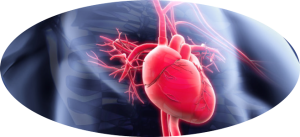
A TCM Perspective on the Heart:
In TCM, the heart is the “king of all organs”. Other organs will sacrifice all to keep the heart in motion; this involves giving away their energy and nutrient supply (commonly referred to as Qi). The heart governs the ability to think clearly, sleep soundly, and maintain a good memory. Our emotional state is strongly influenced by how healthy or unhealthy our heart may be. A weak and deficient heart may create feelings of anxiety and mania, while also contributing to insomnia, forgetfulness, and lack of concentration.
Heart health can be reflected in the facial complexion. A rosy complexion indicates a strong healthy heart, while a pale or sallow complexion is indicative of a deficient, weak heart. If the heart blood becomes stagnant, the complexion may have a purplish tint.
Acupuncture and TCM have been managing heart health for centuries. Regular acupuncture treatments are very helpful in lowering blood pressure. The needles stimulate the release of opioids, which then decrease the heart’s activity and its need for oxygen. This will help the body lower blood pressure, increase oxygenated blood flow, and regulate the heart’s rhythm.
Stress is another factor that can greatly affect the health of the heart. Unmanaged, chronic stress can lead to heart disease, high blood pressure, heart arrhythmias, and even heart attacks. Numerous studies have shown stress can be easily managed through the use of acupuncture. TCM offers more than just acupuncture to treat stress though. Herbal formulas and exercises like tai chi and qi gong are all wonderful tools for managing stress and keeping the heart-healthy.
When the heart is balanced and healthy, it results in an easy transition into sleep. If you have insomnia, the heart is often treated. Difficulty falling asleep, nightmares, and sleep terrors can result when this organ is unhappy. If you are the type of person who lies in bed forever, unable to fall asleep because your mind is racing, acupuncture can help to settle the heart energy and give you a great night’s sleep. Yet again, TCM can help treat a wide array of sleep problems without the harsh side effects of many pharmaceuticals.
Diet Tips
When it comes to your heart, what you eat matters. Follow these tips for heart-healthy eating:
EAT LESS SATURATED FATS.
Look for lean meats, like seafood, poultry, lean cuts of pork, and cut back on fatty red meats and high-fat dairy products. Limit foods like pizza, burgers, and creamy sauces or gravy. Look for products with no trans fats and choose foods with unsaturated fats like salmon, nuts, seeds, avocados, and oils.
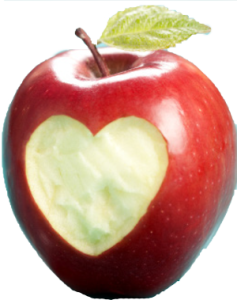
CUT DOWN ON SODIUM (SALT).
Read the Nutrition Facts label and choose foods that are lower in sodium. Look for the low-sodium or “no salt added” types of canned soups, vegetables, packaged meals, snack foods, and lunch meats.
GET MORE FIBER.
Eat vegetables, fruits, and whole grains to add fiber to your diet. Fiber is a carbohydrate that your body cannot break down, so it passes through the body undigested. Fiber can help prevent heart disease from its ability to lower both blood pressure and cholesterol.
CUT BACK ON SWEETENERS.
Consuming too much added sugar can raise blood pressure and increase chronic inflammation, both of which are pathological pathways to heart disease. When choosing a sweetener, look for natural options like honey, dates, maple syrup, molasses, or agave nectar.
Without a healthy heart, the body cannot function properly and the mind may be clouded and disconnected. Contact me at (218) 724-3400 for a consultation to see how acupuncture and Traditional Chinese Medicine can assist you with all of your heart health needs.
3 Ways to Naturally Manage Migraine Headaches

Did you know that acupuncture has been proven to help with headaches and migraines? More often than not headaches will dissipate on their own, or can be cleared up quickly using over-the-counter pain medication; But for nearly 37 million Americans who suffer from migraines, the pain is complex and chronic. Migraines tend to run in families. About 90% of migraine sufferers have a family history of migraines. Migraines are complicated, and more than a passing headache. What differentiates a migraine from a headache are the vast array of accompanying symptoms. These symptoms include visual disturbances or “auras” prior to onset, increased sensitivity to light, nausea, and vomiting, and even speech and functional disturbances. For some, the pain can become so intense their lives get put on hold. Science still struggles to explain what causes migraines which makes it virtually impossible to find a simple “cure” that works for everyone.
In Traditional Chinese Medicine (or TCM), the goal is to get to the root of the migraine, not simply manage the symptoms. Blood deficiency, which is a type of anemia, is a common cause for migraines resulting from a lack of blood nourishment to the head. Blood stagnation can also be a factor. After running the proper set of diagnostic tests, a TCM practitioner can address the correct cause(s) for the pain. A medical practitioner could then apply acupuncture and offer herbs, as well as massage therapy and other complementary treatments to facilitate blood flow and alleviate pain.
What can I do at home?
Along with in-office therapies, eating a balanced diet, exercising, and practicing some acupressure self-care can be very beneficial.
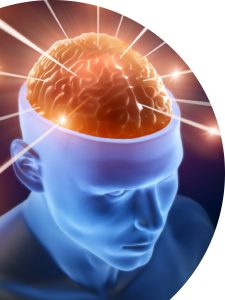
Acupressure
Acupuncture is part of the TCM system that has been around for thousands of years. However, it was only in the 1970’s that acupuncture officially made an appearance in Western medicine. Acupressure is an adaptation of acupuncture, just without the needles. Similar to acupuncture, acupressure uses specific points to balance energy within the body. When somebody is suffering from a migraine, all the energy rushes to their head. By stimulating or applying pressure to points lower on the body the energy can then be drawn downward and reduced, quickly decreasing the intensity of the migraine. Acupuncture also helps with the treatment of other symptoms frequently associated with migraines.
Nutrition
Diet plays such an important role in our lives. It is even more important to pay attention to what is being eaten for those who suffer from migraines. Gluten sensitivities can be a trigger for pain. Gluten is a component found in wheat and is known to increase inflammation in the body. Studies show many migraine sufferers have a deficiency in both magnesium and B vitamins. Magnesium blocks pain-transmitting chemicals in the brain, while B vitamins help decrease oxidative stress in the body that can lead to chronic pain and inflammation. Some foods have been shown to help migraines. Adding coffee, B3 (niacin, found in the liver), magnesium, potassium, calcium, spicy foods, ginger, and watery foods into your diet can be beneficial. A common herb for migraines is the magnolia flower. Others include lavender, peppermint, feverfew, and basil.
Exercise
Everybody knows exercise is good for the body, but for people with chronic pain, it is even more important. Exercise gets the blood pumping and increases oxygenation to the tissues, which are important for relieving pain and inflammation. Just sitting at a desk and working on a computer all day adds an additional 20 to 30 pounds of pressure to our necks! This can create stress and tension on the muscles and tendons in the neck and shoulder area, contributing to migraine pain and frequency. Studies show migraines and other chronic pain levels can be significantly reduced by doing 20 minutes of daily stretching.
If you are one of the 37 million Americans who suffer from migraines, you’re not alone. The silver lining is there are natural cures out there that can help you get your life back. Schedule your acupuncture tune-up in Duluth to get back on track to wellness.
How to Help Someone Suffering from PTSD

Post-traumatic stress disorder (PTSD) is a physiological disorder that can result from being exposed to trauma. Roughly 8 million Americans annually struggle with depression, anxiety, irritability, insomnia, and flashbacks among many other symptoms resulting from this disorder. The effects of PTSD in someone’s life can be far-reaching and completely debilitating if left untreated. Feelings of hopelessness, shame, and despair, problems at work or with relationships, newly or quickly developing health problems, and the overuse of drugs and/or alcohol are all very common. Getting help can be difficult for a variety of reasons, all related to the complexity and severity of this condition.
We often think of PTSD as something that will develop quickly in someone suddenly exposed to the brutality of war. However, the American Psychological Association claims that motor vehicle accidents and domestic abuse are the leading causes of PTSD in the United States. It is also a common misconception that PTSD develops simply from a single exposure to trauma. In domestic cases, trauma often grows in severity, leaving the victim unable to see the seriousness of their situation until they are in a safe environment.

How to Help Someone with PTSD
Watching someone you love and care about suffer from PTSD can be difficult. You may feel uncomfortable and struggle to relate to them. The first step you can take is learning more about PTSD and what it means to suffer from it. Take the time to understand the causes, symptoms, and effects to make sense of what your loved one is going through. When things get tough, it is easy to get frustrated with someone who is dealing with this disorder. Remember they are going through something out of their control and your support could be imperative to their recovery.
Listen, be Patient
To overcome PTSD or any other anxiety disorders, we must first acknowledge this is a stress response. One that naturally interferes with our ability to process emotions properly. Acknowledging there is a fundamental problem with your emotional processing is not an easy thing to do and certainly does not happen overnight. The Mayo Clinic states that “post-traumatic stress disorder symptoms may start within one month of a traumatic event, but sometimes symptoms may not appear until years after the event.” While it is important to encourage treatment, this decision needs to be made by the victim. Do not push them to talk. Instead, let them know you’re always around to listen without judgment when they find themselves ready to talk.
Understanding Triggers and Symptoms
 If you are living with someone with PTSD, it is important to recognize their triggers. Unfortunately, the word “triggered” has taken on a much more diluted meaning in the common eye. Being triggered, as it relates to PTSD, is much more than simply disliking or having an aversion to stimulus. Triggers can be anywhere, sometimes an object, person, place, or even a feeling that reminds them of their traumatic experience can cause complications. Many who suffer from PTSD report feeling as if they were reliving the trauma in the presence of triggering situations. Ask your loved ones to explain their triggers so that you can help them avoid situations or develop a plan with healthy coping skills.
If you are living with someone with PTSD, it is important to recognize their triggers. Unfortunately, the word “triggered” has taken on a much more diluted meaning in the common eye. Being triggered, as it relates to PTSD, is much more than simply disliking or having an aversion to stimulus. Triggers can be anywhere, sometimes an object, person, place, or even a feeling that reminds them of their traumatic experience can cause complications. Many who suffer from PTSD report feeling as if they were reliving the trauma in the presence of triggering situations. Ask your loved ones to explain their triggers so that you can help them avoid situations or develop a plan with healthy coping skills.
Make Sure to Take Care of Oneself
Being around someone who is struggling with PTSD is not only hard for them, but can take a toll on your mental health as well. If you feel overwhelmed or stressed, pause, and don’t forget to take time for yourself to distress and relax.
There is good news here, and that is Traditional Chinese Medicine (TCM) has proven to be incredibly effective in helping those who are suffering from PTSD find relief. TCM offers a vast array of therapies to calm the mind and help the body find balance. Such therapies include acupuncture, herbal remedies, feng shui, diet therapy, tai chi and so much more. Give Heidi a call today at (218) 724-3400 for more information.
Immunity Optimizing Recipes

We’re in the cold and flu season, and this year it’s a HOT topic for many of us. But fear not, there are things that you can do, right now, from the comfort of your home. Considering a Traditional Chinese Medical perspective can help.
The following are different at-home Immune Optimizing recipes that you can make to help your body navigate this season of cold, flu, and virus.
SINUS & NASAL IRRIGATION
Ingredients: 8 oz squeeze bottle, 1 tsp sea salt, warm water
Preparation: Warm the water and salt (ensure it’s not too warm or this may cause nasal irritation)
Setting: Bend over your sink and look straight down at the sink basin while turning your head to a 45-degree angle. Tip the squeeze bottle into your nostril until the liquid runs through your sinuses and leaves the other nostril. (Search “Neti Pot” Instructions online for more detailed instructions).
CAYENNE, HONEY & LEMON TEA
Ingredients: 1 whole lemon, 1 tsp cayenne pepper, 1 tbsp honey, 3 ½ cups water
Preparation: Boil the above ingredients together for upwards of 10 minutes and strain when finished
Setting/Frequency: Drink this tea three times per day.
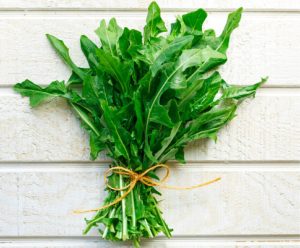
DANDELION SMOOTHIE
Ingredients: 1 head of cabbage, 2 cucumbers, 2 oranges, and 1 cup of dandelion greens.
Preparation: Juice the above ingredients and pour them into a glass
Setting/Frequency: Drink 3 glasses daily
ANTIOXIDANT-RICH NUT MIX
Ingredients: Pine nuts, goji Berries, blueberries (dried), and Brazil nuts
Preparation: Mix together each ingredient to taste preference
Setting/Frequency: Eat once daily as a snack, keep the recommended calorie count in mind with consumption of this mixture.
Keep in mind that there are various ways you can take care of your body in order to bolster your immune health the best chance at fighting illnesses and functioning properly. These include avoiding smoking and taking drugs (that aren’t prescribed by a doctor), which are known for depleting the body’s qi and weakening it. Additionally, keep your emotions in check, negative emotions, stress, and anxiety can suppress immune function. Do your best to remain optimistic and keep a positive attitude with everything going on in the world around us. Start with the basics – exercise, eat right, sleep and stay hydrated to maintain your body’s balance.
Give Heidi call today at (218) 724-3400 to learn more about how Traditional Chinese Medicine can help you stay healthy!
